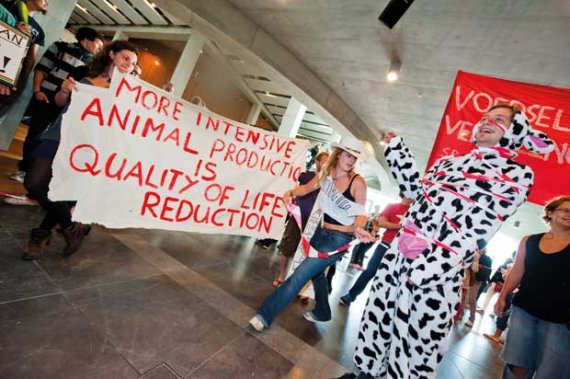Albert Sikkema & Gaby van Caulil asked what the Wageningen community think
Edith Lammerts van Bueren
professor (by special appointment) of Organic Plant Breeding ‘I agree that we will soon have nine billion mouths to feed and that meeting this growth is a huge challenge. And yes, to do so agriculture will need to become more productive. But that doesn’t mean that Dutch agriculture should intensify in the form of factory farms and that we should export food to China. That is not a sustainable solution; it is better to produce the food in the same place it is consumed. A far more effective approach is to help farmers in developing countries, who now produce half a tonne of wheat per hectare, to increase their productivity to three or four tonnes using local resources and improved breeds. There is still scope for improving productivity, for instance by enriching the soils with organic material. Dijkhuizen chooses the intensive model and takes a selective view of its environmental benefits. Pity.’
Thomas Slinkert
second-year student of Agricultural and Bioresource Engineering ‘I’ve considered all of the positions and I’m trying to decide what I think myself. Dijkhuizen is right when he says that intensive agriculture uses less land and resources. But there is more to sustainability than that: it includes things like animal welfare and biodiversity. I agree that on a global level agriculture needs to be intensified in order to feed the world population. But if you take the Dutch system as an example, it would be good to include legislation for animal welfare and biodiversity.’
Hans van Trijp
professor of Marketing ‘Broadly speaking I agree with Dijkhuizen. If you want to feed two billion more people you either have to decrease demand per capita or increase the supply. Demand can be influenced by promoting meat substitutes. Certainly worth doing, but a difficult task. And in attempting to increase supply one runs into issues of land scarcity, and environmental and animal welfare standards. What you want is lots of food per hectare with a low environmental impact. I notice that people are quick to talk about intensive agriculture in black and white terms: intensive agriculture is either bad and ugly, or it is good. As long as you go on seeing intensive and sustainable agriculture as incompatible, you are heading for a dead end. Instead we should be looking to find a new balance for sustainable and highly productive agriculture. We cannot feed the whole world, but we can feed part of it and you don’t want to give up your agricultural exports. And you can export your knowledge.’
David Kleijn
researcher at Alterra ‘Aalt has a one-dimensional approach to a complex problem. I endorse his argument that intensive agriculture can be improved upon in other parts of the world such as large areas of Africa, Asia, and South America. There farmers are still affected by diseases, pests, and weeds. But in the Netherlands we have reached maximum capacity, we really stand out globally. Agriculture here is highly efficient but that comes at the expense of biodiversity. In North-western Europe you must look for smart solutions. If you increase the proportion of organic materials in the soil by just a few percent you need 50 kilos less nitrogen in the form of fertilizer per hectare. These kinds of smart solutions are the way ahead for Dutch agriculture.’
Evelien de Olde
VHL student and chair of the Boerengroep [farmers’] foundation ‘It is a pity that Aalt Dijkhuizen has not done justice to the diversity of opinions in Wageningen. We work together to shape students’ critical skills and find solutions to the food crisis; there is no single truth or solution. The opening of the academic year should also convey this message. In future, as far as we are concerned, it should be more critical, diverse, and inspiring.’
Wijnand Sukkel
researcher in sustainable food systems at PPO ‘Organic farming, or a modern version of it, can provide for the world’s food needs as well. It too focuses on economics, food production, and reducing pollution, but it also pays attention to long term sustainability, fair trade, and health. Many organic principles, such as soil management, can be applied to conventional agriculture. And the organic sector can learn from the modern techniques being applied in intensive agriculture. In other words, I am in favour of dialogue.’
Aalt Dijkhuizen
Chair of the executive board of Wageningen UR ‘Let me make one thing clear: we do not have to opt for one system to the exclusion of all others. The challenge lies precisely in developing a hybrid approach in which elements from various different systems can reinforce each other. But with the common aim of being able to produce more good food for an affordable price. I want to bring in some facts that I feel are missing from the current debate. There are many sides to highly productive agriculture, for example the question of how sustainable you can be while remaining highly productive. Because you cannot approach the world food problem from one angle alone. I have noticed that the prevailing view is in danger of tipping in favour of exclusively extensive agriculture. And I consider that a dangerous development, especially if it means that we no longer want to support our current system of highly productive agriculture. That would not be good for the Dutch agri-food sector, it would not be good for Wageningen UR and it would not be good for the Netherlands. In this country we have learned how to produce good quality food on a small land surface. That knowledge is an export product that is not to be sneezed at. So it is a great opportunity to use it to make food production sustainable on a global scale.’

